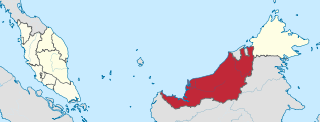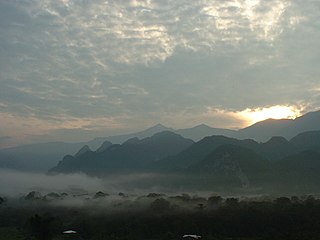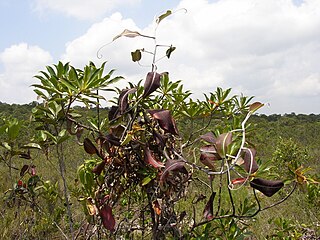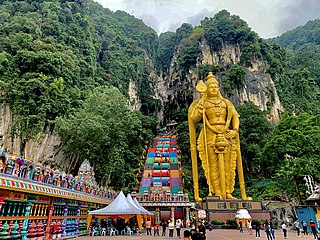
Sarawak is a state of Malaysia. The largest among the 13 states, with an area almost equal to that of Peninsular Malaysia, Sarawak is located in the region of East Malaysia in northwest Borneo, and is bordered by the Malaysian state of Sabah to the northeast, Kalimantan to the south, and Brunei in the north. The state capital, Kuching, is the largest city in Sarawak, the economic centre of the state, and the seat of the Sarawak state government. Other cities and towns in Sarawak include Miri, Sibu, and Bintulu. As of the 2020 Malaysia census, the population of Sarawak was 2.453 million. Sarawak has an equatorial climate with tropical rainforests and abundant animal and plant species. It has several prominent cave systems at Gunung Mulu National Park. Rajang River is the longest river in Malaysia; Bakun Dam, one of the largest dams in Southeast Asia, is located on one of its tributaries, the Balui River. Mount Murud is the highest point in the state. Sarawak is the only state of Malaysia with a Christian majority.

Kuching, officially the City of Kuching, is the capital and the most populous city in the state of Sarawak in Malaysia. It is also the capital of Kuching Division. The city is on the Sarawak River at the southwest tip of Sarawak on the island of Borneo and covers an area of 431 km2 (166 sq mi) with a population about 165,642 in the Kuching North administrative region and 159,490 in the Kuching South administrative region—a total of 325,132 people.

The Gunung Mulu National Park is a national park in Miri Division, Sarawak, Malaysia. It is a UNESCO World Heritage Site that encompasses caves and karst formations in a mountainous equatorial rainforest setting. The park is famous for its caves and the expeditions that have been mounted to explore them and their surrounding rainforest, most notably the Royal Geographical Society Expedition of 1977–1978, which saw over 100 scientists in the field for 15 months. This initiated a series of over 20 expeditions now named the Mulu Caves Project.

Bako National Park is a national park in Kuching District, Kuching Division, Sarawak, Malaysia. Established in 1957, it is the oldest national park in Sarawak. It covers an area of 27.27 square kilometres (10.53 sq mi) at the tip of the Muara Tebas peninsula at the mouth of the Bako and Kuching Rivers. It is approximately 40 kilometres (25 mi) by road from Kuching. Millions of years of erosion of the sandstone have created a coastline of steep cliffs, rocky headlands and stretches of white, sandy bays. Wave erosion at the base of the cliffs has carved many of the rocky headlands into fantastically shaped sea arches and seastacks with colored patterns formed by iron deposition. The most famous of them was shaped like a cobra's head which could be spotted on a boat ride from the headquarters or one of the beaches. This collapsed in 2024 and is no longer present. Some of these rock formations can be seen on entry to the Teluk Assam Beach, which fronts the park. The park can only be reached by a 20-minute boat ride from the village of Kampung Bako. It is often visited as a day-trip from Kuching, though accommodations are available.

Odoardo Beccari was an Italian botanist famous for his discoveries in Indonesia, New Guinea, and Australia. He has been called the greatest botanist to ever study Malesia. His author abbreviation is Becc. when citing a botanical name.

Lundu is a town and the capital of Lundu District located in the northwest of Kuching Division of Sarawak, Malaysia, and borders the Indonesian Province of West Kalimantan.

The black-capped fruit bat is a species of megabat in the monotypic genus Chironax.

Petra Jaya is a suburb of Kuching, Sarawak, Malaysia. This suburb was named after sixth Yang di-Pertuan Agong, Tuanku Yahya Petra of Kelantan (1975-1979).

Tourism in Malaysia is a major industry and contributor to the Malaysian economy. Malaysia was once ranked 9th in the world for tourist arrivals. In 2017, the Travel and Tourism Competitiveness Report ranked Malaysia 26 out of 141 countries using its Travel & Tourism Competitiveness Index (TTCI) which measures the various components and policies of a country that are in place to allow for the sustainable development of its travel and tourism sectors.
The Diocese of Kuching is a diocese of the Anglican Church of the Province of South East Asia that covers Sarawak and Brunei. Founded in 1962, the see was originally established as the Bishopric of Sarawak linked to the Diocese of Labuan in 1855. The current bishop is the Most Rev'd Danald Jute, 14th Lord Bishop of the Diocese of Kuching and Brunei, who was consecrated on 13 August 2017. His seat is at St. Thomas' Cathedral, Kuching.

The Kuching Wetlands National Park is a national park in Petra Jaya, Kuching District, Kuching Division, Sarawak, Malaysia. It is the remains of the former Sarawak Mangrove Forest Reserve which covered 170 km2.

The environment of Malaysia is the biotas and geologies that constitute the natural environment of Malaysia. Malaysia's ecology is megadiverse, with a biodiverse range of flora and fauna found in various ecoregions throughout the country. Tropical rainforests encompass between 59% and 70% of Malaysia's total land area, of which 11.6% is pristine. Malaysia has the world's fifth largest mangrove area, which totals over a half a million hectares.

The Padawan municipality is a collective name given to a subset of the Kuching District area which is not administered locally by the Kuching South City Council and the Kuching North City Hall, formerly known as Kuching Rural district. It has an area of 1771.3 km2, covering the suburbs of the Kuching Proper subdistrict and Padawan subdistrict. The area is currently administered by the local government named Padawan Municipal Council, based in Kota Padawan, located at 10th mile from Kuching city centre.
Limnonectes hikidai is a species of fanged frogs in the family Dicroglossidae. It is endemic to Sarawak, East Malaysia (Borneo). Its type locality is Mount Serapi in Kubah National Park, Matang, Kuching District, Sarawak. It is closely related to Limnonectes cintalubang.
The Gunung Gading National Park is a national park in Lundu District, Kuching Division, Sarawak, Malaysia. The park is located roughly two hours drive from Kuching, and is a popular destination for seeing the Rafflesia flower in bloom. After 10 years as a conservation zone to protect the Rafflesia, the park opened to visitors in 1994. The park also has a number of jungle trails to waterfalls or to the 965m summit of Gunung Gading.

The Santubong National Park is a national park in Kuching Division, Sarawak, Malaysia, 35 km north of Kuching. It contains the 810m peak of Mount Santubong and surrounding rainforested slopes. There are a number of jungle treks in the park, including to the peak. Wildlife in the park include proboscis monkeys and rhinoceros hornbills.
Alcalus sariba, also known as Saribau eastern frog or Saribau dwarf mountain frog, is a species of frog in the subfamily Alcalinae, family Ceratobatrachidae. It is endemic to Sarawak, Malaysian Borneo, where it is known from a small number of locations, including the eponymous Mount Saribau. It has often been included in Alcalus baluensis, but is now considered a distinct species. The two species are similar but Alcalus sariba is larger.
Katharine Georgina "Kit" Pearce, is a British botanist and forest ecologist.

The economy of Sarawak is the fourth-largest of the states of Malaysia, making up 9.3% of the Malaysian gross domestic product (GDP) in 2022. Meanwhile, Sarawak is home to 7.9% of the Malaysian population based on the 2020 census.















